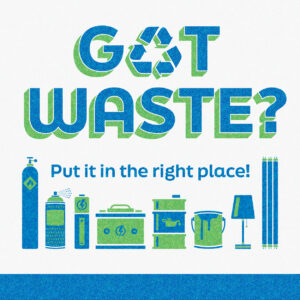Pollution Prevention
Partnering with small businesses and minor generators of dangerous waste in Spokane County to prevent pollution.
Program Overview
Spokane Regional Health District (SRHD) provides dangerous waste management evaluation and education to area small businesses as a member of Washington state’s Pollution Prevention Partnership. Pollution prevention specialists identify potential sources of pollution and share best management practices to help businesses make improvements that protect human health and the environment. Learn more about this free service.
Pollution Prevention Partnership
The Pollution Prevention Partnership is comprised of representatives from cities, counties, and health districts. Funding assistance is provided by the Department of Ecology and allows the program to provide free hands-on-assistance to Small Quantity Generators* (typically small businesses and organizations) who wish to improve their practices by reducing impacts to human health and the environment.
This is accomplished through technical assistance visits that are designed to reduce or eliminate hazardous waste and pollutants at the source. A local pollution prevention specialist will meet with your organization to evaluate current activities and practices. They will discuss concerns, observations, solutions, and work directly to help solve common challenges around dangerous wastes, stormwater, solid waste, and spill prevention. This collaborative process limits liability, reduces risk, and improves work environments. If you would like to learn more about this program, contact your local specialist at 509.324.1560, ext. 3, or email pollutionprevention@srhd.org. More information about the Pollution Prevention Partnership is also available on the Department of Ecology’s website.
*Learn more about Small Quantity Generators, including applicable businesses and regulations.

Spokane, Kootenai Waste Directory
Learn about all types of waste and search for local vendors that manage specific types of waste.


